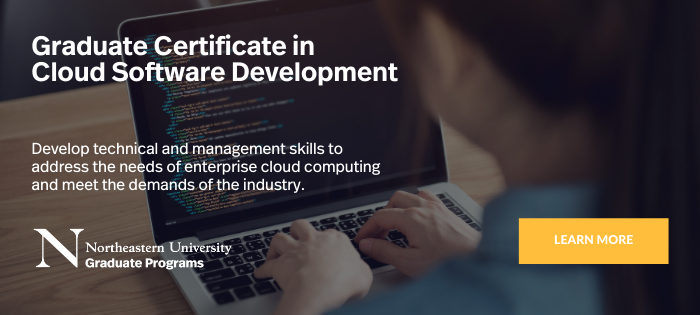Cloud computing refers to the on-demand delivery of various IT resources via the internet. Data storage, data processing, analytics, virtual servers, cloud-based software and tools, and various other computing services can all fall under the bucket of cloud computing.
According to a study conducted by Grand View Research, the cloud computing market was worth an estimated $266 billion in 2019, and that market is only continuing to grow as more and more businesses undergo digital transformation. That same report estimates that the market will grow by roughly 15 percent annually between 2020 and 2027.
This growth is triggered by a number of factors including the fact that cloud computing can be very beneficial to businesses. Relying on this function is often cheaper, faster, and more efficient than building similar resources from scratch. At the same time, increased adoption of new technologies—such as edge computing, the Internet of Things (IoT), 5G, artificial intelligence, and machine learning—all rely on the resources offered by the cloud.
(It is important to note that this report was conducted before the emergence of the COVID-19 pandemic, which has forced countless businesses to transition into remote work—bringing with it even more demand for cloud computing services.)
This increased demand has created a growing need within companies for employees who can demonstrate the skills required to complete cloud computing tasks.
Cloud Computing Job Outlook
According to the Bureau of Labor Statistics (BLS), employment of computer and technology occupations is expected to grow approximately 12 percent from 2018 to 2028—more than double the 5 percent growth expected for all occupations over the same time period. The Bureau states that “demand for these workers will stem from greater emphasis on cloud computing, the collection and storage of big data, and information security.”
Earning a cloud computing certificate is one way to quickly and affordably learn the skills that employers are looking for in their IT employees. But not all cloud computing certificates are the same.
Below, we share tips for evaluating various cloud computing programs before enrolling so that you can feel confident in your final choice.
Prepare for a Successful Career in Cloud Computing
Learn how Northeastern’s Graduate Certificate in Cloud Computing can accelerate your career.
What to Look for in a Cloud Computing Certificate Program
1. Look for the right blend.
According to Ian Gorton, PhD, director of computer science programs at Northeastern University—Seattle, individuals who are considering earning a certificate in cloud computing should seek out a balanced curriculum. Courses should equally focus on both cloud development and practical skills, while also including the underpinnings of computer science and software engineering, he says.
“If you learn just the cloud skills, you’re effectively becoming a tradesperson,” Gorton says. “You know how to do certain things, but you don’t really understand the ‘why’ behind it.”
Instead, search for a cloud computing certification program that can give you a broader perspective on the field, including the basics of computer science and software engineering, DevOps type practices, continuous deployment. This, Gorton says, will offer a much more stable foundation for your career.
“You will be much better off than someone who just knows how to click buttons under certain circumstances,” he explains.
2. Look for high-quality instructors.
Finding a program that offers the right blend of skills and knowledge is important, but it isn’t the only factor you should take into consideration when evaluating programs, Gorton says. It’s also important to understand who you will be learning these skills from.
While anyone with a solid understanding of cloud computing can teach others those same concepts, the most effective professors tend to be those who have real, hands-on experience in the field. Actually working in the industry gives an instructor insights into the everyday problems and challenges that cloud computing professionals experience in the field, which they can then pass on their students.
“There’s a lot of people on the market who just know one particular technology and don’t have any great experience beyond that,” Gorton says. “At Northeastern, we’ve got PhD-level instructors and individuals with experience building real systems.”
3. Consider your career goals.
Finally, Gorton recommends that any prospective cloud computing student spend some time thinking about the different cloud providers they may wish to work with, and seeking a certificate program that specifically incorporates a curriculum and networking opportunities related to those platforms. Some popular providers include Amazon Web Services (AWS), Microsoft Azure, Google Cloud Platform, IBM Cloud Services, and others.
“Definitely look at the connection to a cloud provider that a potential certificate gives you,” Gorton says. “Cloud computing is a funny field in that, even though there’s a lot of underlying knowledge you need, it really doesn’t make any great deal of sense outside of the context of a given cloud provider [such as] Google or Microsoft. So you really need to have hands-on experience to embed the sort of foundational knowledge that underpins that experience.
That being said, Gorton explains that, though the specifics of how each provider works may vary, the underlying mechanics are largely the same.
“What’s really useful is that once you know one cloud, the others aren’t very different,” he says. “The basic knowledge is pretty transferable across platforms.”
Choosing the Right Cloud Computing Certificate for Your Career
If you’re interested in breaking into the field of cloud computing, earning a graduate certificate is one effective way to obtain the skills and knowledge that employers want and expect. Consider each of the factors above as they relate to your unique career goals and aspirations as you evaluate various programs.
One option that aligns with each of these factors is the Graduate Certificate in Cloud Software Development offered by Northeastern University.
Designed to help students develop both the technical and management skills required to work in the field of enterprise cloud computing, the certificate empowers students to identify frameworks, techniques, and existing IT solutions in order to manage internet services at a range of levels, including software, platform, and infrastructure.
The result is preparation for a range of career paths. Former students have been hired directly by web service providers such as AWS, IBM, and Microsoft Azure, while others have been employed as IT solutions managers within various organizations that contract with web service providers.
Are you interested in pursuing a certificate in cloud computing? Learn more about Northeastern’s program here. 






Related Articles
Why This Alum Decided to Earn His Master’s Degree in Computer Science
The Top 10 Highest-Paying Big Data Careers
Data Scientist vs. Data Analyst: What’s the Difference?